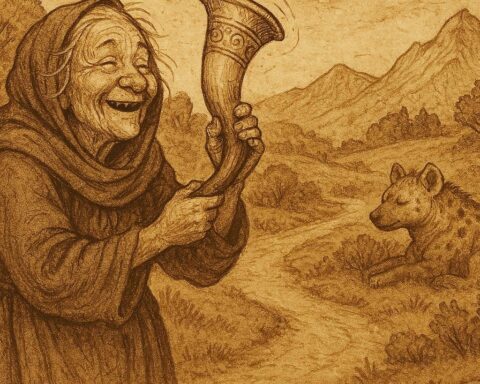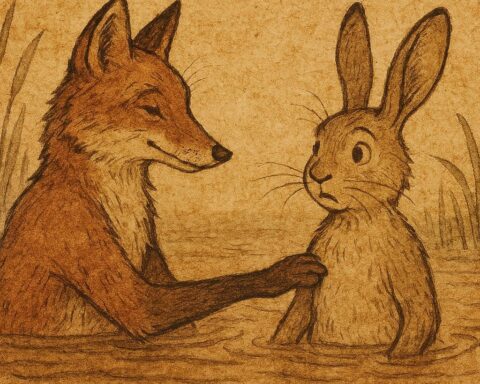Everyone in the town knew Old Fatou. She was the midwife who had brought countless babies into the world. Families from the town itself and from nearby Bir sought her help whenever a woman went into labour. Her home stood on the edge of the old Black village, the place that, over time, was replaced with wide streets and houses built in the European style. I had not seen her in many years, and I often wondered if she was still alive. She had been very old even when I left Dakar for Saint-Louis, and it seemed possible that she had passed away. Yet during my last days there, she was still living. And it was then that I heard from her own lips a strange story, one that remains unforgettable.
One night, long after she had fallen asleep, Old Fatou was startled awake by a loud knock at her door. Believing that a woman was in labour and that she was being called for her usual work, she rose, wrapped her cloth around her, and opened the door.
To her shock, standing before her was no human being but a towering jinn. His presence filled the doorway, his form immense and shadowy under the moonlight. Terrified, Fatou tried to step back, but the jinn reached out, seized her hand firmly yet not cruelly, and beckoned her to follow. Without uttering a word, he gestured ahead.
Her old body shook with fear. It was not the chill of the season that made her teeth chatter, it was dread. Though it was mid-winter, she knew that no cold could strike so sharply as fear. And what could she do? She was too frail to run, and who among mortals could escape a jinn’s pursuit? Resigned, she obeyed.
READ: Samba Atta Dabo: The Bourhama of Thievaly | Wolof Folktale from Gambia
They walked for a long while. The jinn, noticing her age, slowed his pace to let her keep up. Strangely, his restraint reassured her. He did not appear to intend harm. Step by step, her fear eased, though her heart still raced. Yet she remained bewildered, for she knew Dakar well, but she could not recognize the path they took.
At last, they stopped before a magnificent sight. Rising in the darkness stood a castle grander than anything Fatou had ever seen, as vast and splendid as the palace of the Borom Bir, the Governor-General. Its walls gleamed with light. Silently, the jinn led her across the wide courtyard, through deserted chambers, until they reached a richly adorned room.
Inside lay a young jinn woman, radiant in her beauty, adorned with gold filigree and precious jewels. Her bed was carved from ebony, its dark wood inlaid with gleaming silver designs. Surrounding her were many other jinns, men and women alike, dressed in luxurious garments, their presence both regal and otherworldly.
Fatou at once understood why she had been brought there. The young jinn woman was in labour. She had been chosen to assist at the birth. Drawing upon her lifetime of skill, Fatou set to work. Minutes felt like hours, but at last she delivered a tiny jinn child, whom she carefully washed and swaddled. Tenderly, she placed the newborn into the arms of its radiant mother.
No sooner had she done so than the vision dissolved. The castle vanished, the richly dressed jinns disappeared, and the bed with its glittering silver faded into nothingness. Fatou found herself once again at the edge of Dakar, standing near the hospital. The road home lay just a short walk away.
Still trembling, she returned to her house. To her astonishment, upon her table lay a great heap of gold coins and a heavy silver bracelet, her payment. Fatou knew at once that this gift came from the young jinn mother, who was surely a queen among her kind.
The bracelet was no ordinary work. Its filigree design shone with unmatched craftsmanship, finer even than that of the Mauritanian jewellers. The silver never tarnished, no matter how many years passed. Fatou treasured it deeply. Many Europeans who saw it begged to buy it, offering handsome sums, and some returned more than once to persuade her. Yet Fatou always refused to sell. If she still lives, the bracelet must still be with her, gleaming as brightly as the night she received it.
Moral Lesson
This folktale reminds us that skill and service bring honour even in unexpected places. Old Fatou’s courage, wisdom, and humility allowed her to serve beyond the human world, and in return, she was richly rewarded. Her story also teaches that when we dedicate ourselves sincerely to helping others, blessings may come in mysterious ways.
Knowledge Check
Q1: Who was Old Fatou?
She was a respected Gambian midwife who helped women in childbirth.
Q2: Why was Fatou taken by the jinn?
She was summoned to assist a young jinn woman giving birth.
Q3: What did Fatou see when she reached the palace?
A grand castle filled with richly dressed jinns and a jewelled bed of ebony and silver.
Q4: What task did Fatou perform for the jinns?
She delivered a newborn jinn child and cared for it.
Q5: What reward did Fatou receive for her service?
A heap of gold coins and a finely crafted silver bracelet.
Q6: What lasting lesson does the tale convey?
That dedication to one’s calling and humble service can earn respect and blessings, even from the unseen world.
Folktale Origin
Source: Wolof Folktale, The Gambia, West Africa. Recorded in François-Victor Équilbecq’s Contes Indigènes de l’Ouest-Africain Français (1913).







